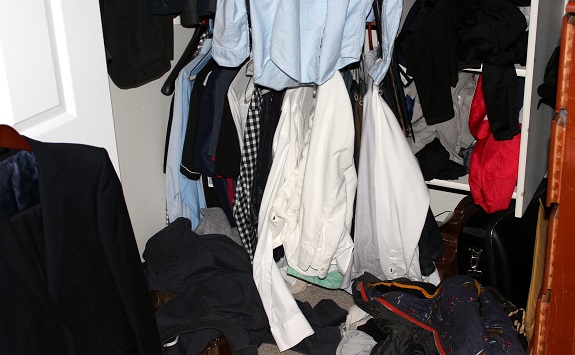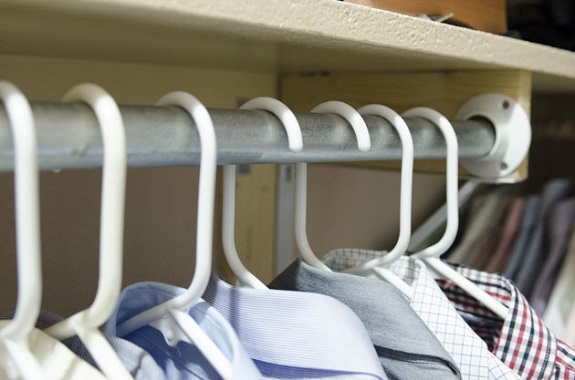The Dappered philosophy is all about looking good without costing an arm and a leg. While that usually means finding great pieces and even better prices, this series is about how to store what you’ve already got. We’re going to look at how to clear the clutter, how to outfit a closet, and how to use that closet to its full potential.
Before you can build your closet up, you’ve got to tear it down. Clearing the clutter is an important first stage because it’ll let you know what you’re really working with. Once you know what you’ve got, then you can design your new closet around it. If you have lots of collared shirts, you’ll need lots of rods. If you have lots of sweaters, you’ll need more shelves/drawers. You get the idea. So on that note, let’s just dig right in. No really. We might have to dig.
 Someone get the backhoe
Someone get the backhoe
.
SEVEN STEPS TO CLEARING CLOSET CLUTTER
1. Wash everything you own
The is step one for good reason. You’ve got to take inventory of everything you’ve got. Get it clean and put away where it belongs. That way you can survey your wardrobe in its entirety.
2. Slash and burn
Now we’ve got to thin the herd. Don’t stress too hard about what to keep and what to get rid of. We’ll worry about in the next steps. The most important thing here is to get rid of the things you obviously don’t want anymore. Using a numbering scale can help. If it scores a 5 out of 10 or worse, get rid of it. There are some suggestions coming up in step #7 if you need more help, but just make sure you scroll back up for steps 3 through 6.
3. Adopt the “Reverse hanger technique”
Now that we’ve gotten the stuff you obviously don’t want any more out of the way, it’s time to work on the less obvious stuff. This is a technique used by professional organizers. I’m not sure that it has a name so I’m just calling it the “reverse hanger technique”. Catchy, right? All you have to do is take all of your hanging clothes and hang them from the back of the rod instead of across the front like you normally would. Pull items from the closet and wear them as normal, but when they’re washed and go back into the closet, hang them as you normally would on the front of the bar. This will help you differentiate between what you have and haven’t worn.
 The reverse hanger technique in action.
The reverse hanger technique in action.
4. Do the same with folded clothes
Just because it’s not on a hanger doesn’t mean you can’t use the same technique. Use two different piles or two different drawers – whatever works for you. The key is to separate what you have and haven’t worn. How you do it is not nearly as important.
5. Wash clothes often
The secret ingredient to making the reverse hanger technique work is to wash often. If you’re not washing often enough, you’ll start wearing clothes you normally wouldn’t keep just because they’re clean. So keep your closet stocked with what you would rather be wearing. Most of us know when we’re well overdue for laundry. Try not to get to that point during this process.
6. After 90 days, decide on anything that hasn’t been used
If you haven’t used something in 90 days, what are the chances that you ever will? Of course, seasons and weather affect what you’re wearing so take that into account. There will also be exceptions for items like tuxes, but you get the idea. It’s decision time.
7. Judgement day
Now that you have all these unworn items, it’s time to go through them. You’ve got several options.
- If it’s damaged, just throw it away. That’s probably why it hasn’t been worn. If it was worth wearing, you would have fixed it.
- If it’s worth something, consign it. Craigslist and ebay are also options. Another great option is the Swap and Shop forum on Dappered Threads.
- Anything left can be donated. There’s no sense is tossing out something that someone else may be able to use.
- If you’re going to keep it after all of this, you better have a damned good reason.
- If it’s a 40R jacket or a 12D pair of shoes, you can always just give them to me for all of this helpful advice!
Coming up tomorrow: Part II: Outfitting your newly cleaned out closet. On Wednesday, Part III: Building a System for moving forward. When not de-creasing shoes or keeping his closet in good shape, you’ll find Roving Style Contributor Alan S. participating as an active member on Threads.